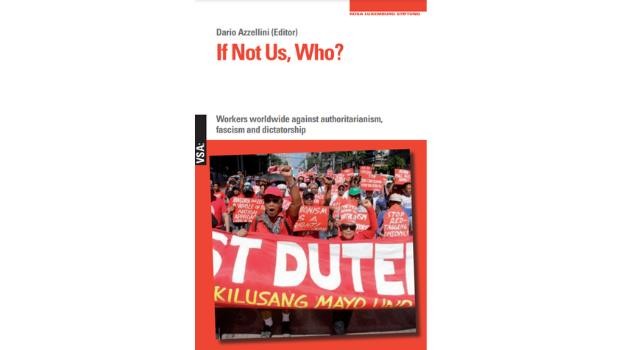The Rosa Luxemburg Foundation Geneva Office warmly invites you to the online launch event for the edited volume “If Not Us, Who? Global workers against authoritarianism, fascism, and dictatorships” at 14:00 CET on 2nd February 2022. The aim of the event is to present the volume and dive deeper into some of the contributions by the authors, but also to take stock of global developments in the aftermath of the book’s release. Speakers will present their chapters, discuss the further evolution of their work, and participate in Q&A sessions with the audience. More information about the volume could be found here.
- Jan Leidecker, the Rosa-Luxemburg-Stiftung Geneva office director, will give an introduction to the RLS and the recently established Geneva office. Editor Dr. Dario Azzellini will moderate the discussion, present the volume overall and reflect on the recent global developments since the release of the book. He argues that the pandemic marks a visible turning point and change of circumstances regarding workers’ struggles and structural power.
- Nicole Ulrich will highlight how the workers’ movement in South Africa fought apartheid with workers’ democracy between 1950 and 1990 and what we can learn from it today.
- Jeremy Morris will discuss the experience of workers and alternative unions battling neo-authoritarianism, co-optation and resistance in Russia.
- Anna Calori will provide a perspective from Bosnia & Herzegovina by focusing on workers’ organization at the root of the 2014 social uprising, and how class action and self-organization defeated ethnic divides of institutional policies.
- Domingo Perez and Sebastian Osorio will analyze the Chilean anti-neoliberal revolt and general strike in 2019, and how workers acted beyond the workplace.
Register here. Simultaneous interpretation from and to English and Spanish will be available.
About the book
Across the world, authoritarianism is on the rise, as a look at Donald Trump, Recep Erdoğan, Jair Bolsonaro, Viktor Orbán, and a host of other heads of government makes clear. In Latin America, coups are becoming commonplace again and finding international acceptance, just like in Egypt too. In multiple countries throughout the Arab world, protest movements in response to the post-2008 crisis have been suppressed with brutal violence. However, heavy-handed state violence is also being used against protestors in countries such as France and the USA. The effects of the crisis trickle down repressively to the most vulnerable, while the redistribution of wealth flows increasingly towards those at the top.
Class composition is in flux. Although the working class was never predominantly white and male, today’s labor struggles are being led increasingly by women, immigrants and black and brown workers. Additionally, the waged workplace is not the only sight of struggle for working people, as class revolts in several countries, from Black Lives Matters, to gig economy workers unionizing, to working-class protests and actions in Bolivia and Chile, have shown recently.
In struggles for democratization, workers continue to play a central role: from the new, class-conscious feminism to the mass protests that have erupted in countries such as Chile, Lebanon, and France. How have workers historically fought against fascism, dictatorships, authoritarian regimes, and repressive tendencies in society, and how are they doing so today? And how do they organize themselves within and outside of trade unions?
The titled volume features contributions from some 30 authors on the new class-conscious feminism and labor struggles during the COVID-19 pandemic, as well as stories from France, the USA, Germany, Japan, Chile, Brazil, Colombia, Israel, Lebanon, Iraq, Iran, the Philippines, Russia, Argentina, Spain, Indonesia, South Korea, the former East Germany, Tunisia, Egypt, and Bosnia-Herzegovina.
